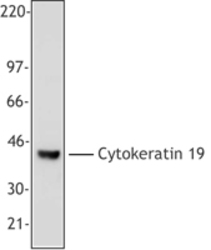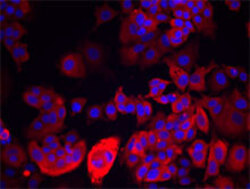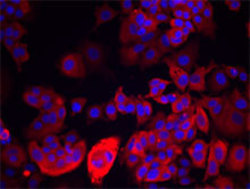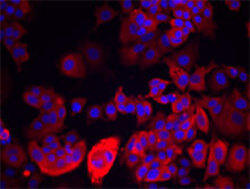Antibody data
- Antibody Data
- Antigen structure
- References [0]
- Comments [0]
- Validations
- Western blot [1]
- Immunocytochemistry [3]
Submit
Validation data
Reference
Comment
Report error
- Product number
- LS-B2003 - Provider product page

- Provider
- LSBio
- Product name
- PathPlus™ KRT19 / CK19 / Cytokeratin 19 Antibody (clone A53-B/A2) LS-B2003
- Antibody type
- Monoclonal
- Description
- Affinity purified
- Reactivity
- Human
- Host
- Mouse
- Isotype
- IgG
- Antibody clone number
- A53-B/A2
- Storage
- Store at 4°C. Store undiluted.
No comments: Submit comment
Enhanced validation
- Submitted by
- LSBio (provider)
- Enhanced method
- Genetic validation
- Main image

- Experimental details
- MCF-7 cell extract was resolved by electrophoresis, transferred to nitrocellulose and probed with monoclonal anti-cytokeratin 19 antibody (clone A53-B/A2). Proteins were visualized using a goat anti-mouse secondary conjugated to HRP and a chemiluminescence detection system.
Supportive validation
- Submitted by
- LSBio (provider)
- Enhanced method
- Genetic validation
- Main image

- Experimental details
- MCF-7 cells were stained with anti-Cytokeratin 19 (clone A53-B/A2), followed by Alexa Fluor 546 secondary antibody and DAPI (nuclei). Images were acquired on a Nikon FC300 inverted microscope at 20X magnification. Data provided by Dr. John Nolan, La Jolla Bioengineering Institute.
- Submitted by
- LSBio (provider)
- Main image

- Experimental details
- MCF-7 cells were stained with anti-Cytokeratin 19 (clone A53-B/A2), followed by Alexa Fluor 546 secondary antibody and DAPI (nuclei). Images were acquired on a Nikon FC300 inverted microscope at 20X magnification. Data provided by Dr. John Nolan, La Jolla Bioengineering Institute.
- Submitted by
- LSBio (provider)
- Main image

- Experimental details
- MCF-7 cells were stained with anti-Cytokeratin 19 (clone A53-B/A2), followed by Alexa Fluor 546 secondary antibody and DAPI (nuclei). Images were acquired on a Nikon FC300 inverted microscope at 20X magnification. Data provided by Dr. John Nolan, La Jolla Bioengineering Institute.
 Explore
Explore Validate
Validate Learn
Learn Western blot
Western blot ELISA
ELISA Immunocytochemistry
Immunocytochemistry Immunohistochemistry
Immunohistochemistry